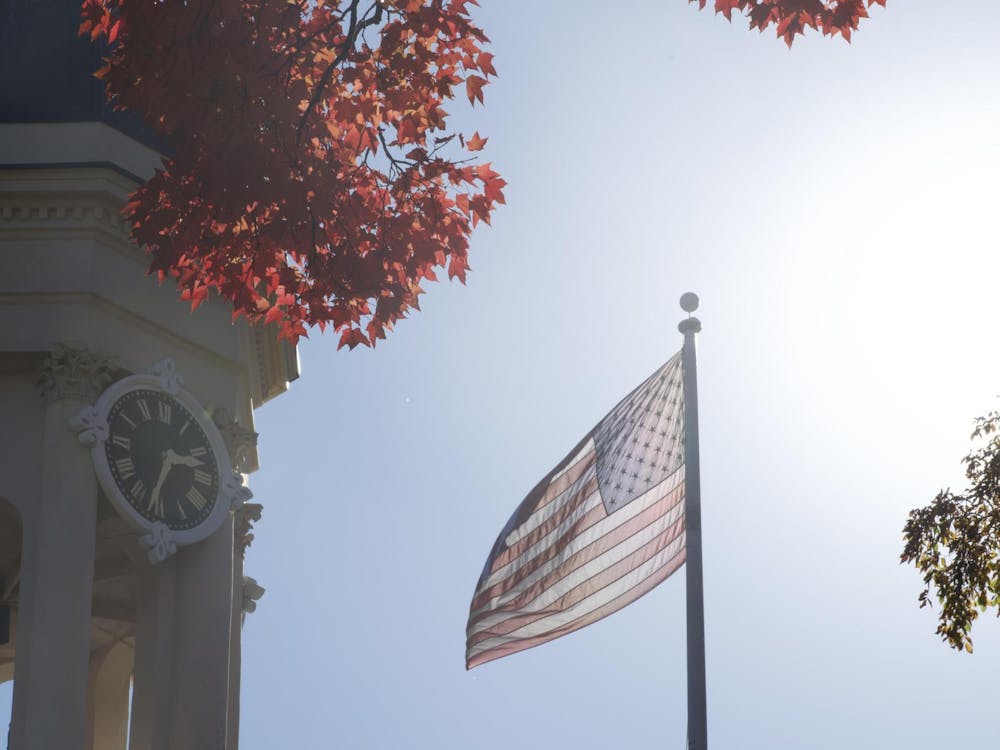Last week 618 members of the Class of 2005 began their Princeton careers by participating in Outdoor Action. In Dillon Gym to greet them on their first day was Outdoor Action director Rick Curtis '79. 'Prince' staff writer Molly Gulland recently asked Curtis questions about the OA program.
'Prince': How long have you been running Outdoor Action? Did you create it? What gave you the idea?
Curtis: I have been the Director of Outdoor Action for the past 20 years.
I didn't start Outdoor Action. It began in 1974. I entered Princeton as a freshman in 1975, the second year of OA. I went on my first trip over Fall Break — I actually missed going on my own Frosh Trip. After that first trip I went on to become a leader and led trips for OA for the next three and a half years.
The idea for creating the program came from Steve Boehlke '70 and others in the Dean of Students Office. The idea was to provide a more intensive bonding experience for incoming frosh through a six day wilderness orientation program.
P: Where do the OA trips take place? What is your personal favorite trail?
C: OA trips take place in a variety of wilderness areas in the Mid-Atlantic and New England. This year we had trips in Pennsylvania and Maryland, northern New Jersey, New York, Connecticut, Massachusetts and Vermont. My personal favorite is the Green Mountains in Vermont.
P: What is the closest encounter you or an OA group has had with something dangerous in nature?

C: The most dangerous encounter we have on OA trips is bee stings and the possibility for someone to have an extreme allergic reaction. Luckily, this year we had no incidents with any allergic individuals being stung.
If you are asking about "close encounters with the animal kind" then bear encounters are right up there. There were a number of bear sitings this year — especially in northern New Jersey, where a group had [its] food stolen not once but twice by a mother bear and her cubs. The group lost food one night and then did a really good job of hanging their food the following night, only to find out that the cubs were able to climb out on the branch and knock the food down to their mother.
P: How did this year's trips compare to those of previous years?
C: This year's trips went incredibly smoothly. The weather was tremendous all across the East Coast and water was generally plentiful. All of these things help set the stage for a good week.

The really important part of a great trip is the leaders. This year we had a tremendous group of 163 leaders, all of whom did a fantastic job of working with 618 frosh. We did three days of training beforehand to prepare them to help introduce students to Princeton and to what it means to be a member of a diverse community.
P: If you were stranded in the forest for a month, and could only bring five things, what would they be and why?
C: Food, a water bottle, magnesium fire starter to build a fire, water purification tablets to purify drinking water and a knife.
P: Has there ever been a time when you didn't follow your own leave-no-trace policy?
C: There have been a few emergency situations that I have been in [which] hypothermia or other major safety concerns have taken priority over leave-no-trace. This is the right thing to do in most emergency situations.
P: What are the different ways upperclass students can participate in OA after their freshman trips are over?
C: Students are encouraged to take part in the OA Leader Training Program to become OA Trip Leaders. We also rely on support teams and communication center managers. The students on the support teams do an incredible job of providing transportation and support to trips while they are out on the trail. The comm center managers are the central hub coordinating trips and support teams from Princeton.
P: If you had to convince someone who didn't like hiking to love the outdoors, what would you say?
C: First, hiking is not for everyone. Some prefer canoeing, biking, climbing, cross-country skiing or other ways to explore the outdoors. I am a firm believer that almost anyone can learn to enjoy the outdoors by learning the basic skills to feel comfortable.
I don't think it's any different than learning to play an instrument. You don't necessarily "love" to play the piano when you first start. You have to learn enough about it to feel some level of comfort and confidence and then you can play — or hike or canoe — for hours on end. People need to go out and gradually work up as they develop skills and experience. The thing that sours people from hiking or almost any other outdoor sport is trying something that's too high above their comfort level. The natural world has an incredible amount to teach us if we can go out quietly and listen.







